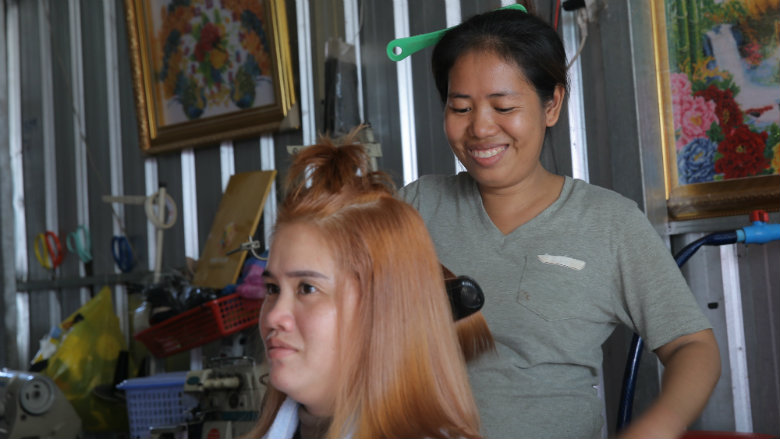In a tin roof cottage along the National Road 5 on the outskirts of Phnom Penh, 34-year-old Theng Malen, is busy coloring her client’s hair while her husband gives a client a manicure.
Malen and her husband have opened this hair salon shop for almost two months on a small plot of land that they rented for $50 a month in Sangkat Preak Ta Ten in Khan Preak Pnov.
With this new shop, they earn between 100,000 riel and 200,000 riel (US$25 and US$50) per day.
Malen and her husband were among the first 15 trainees that were selected from the poorest families in Phnom Penh who received a three-month training course on marketable skills such as hair dressing, skin care, facial massage, and make up. This training is a pilot program under the Livelihood Enhancement and Association of the Poor Project (LEAP), which is supported by the World Bank since 2017.
The project plans to provide skill training to 750 poorest people in the targeted khan (districts). So far, at least 83 poorest people from 13 sangkats (commune) in 12 khan of Phnom Penh have been selected and are being trained.
LEAP aims to improve access of poor and vulnerable households in selected rural and urban communities of Siem Reap and Phnom Penh with opportunities for generating income, as well as access to sustainable local savings and credit services and and small-scale infrastructure. For Phnom Penh, the project provides skills training through a voucher scheme so that participants have flexibility to enroll in training institutions that meet their specific needs, and which help them find jobs after they complete their training. It also aims to improve access to reliable and affordable water supply and sanitation services, small-scale irrigation, drainage, and community access roads.
Malen dropped out from school at grade 7 to support her family of six after her father passed away. She worked as a housemaid earning 120,000 riel (US$30) per month when she was about 14 years old. Then she was a garment worker and sold vegetables on a mobile food cart along the streets of Phnom Penh after she had a baby. Her husband was a construction worker. She could only earn about 10,000 riel (US$2.5) per day to support the family. Because she didn’t earn very much, she sometimes had to borrow money from a private lender with an interest rate of 120 percent.
Since attending the training, Malen has used her skills to earn more income, which is helping to repay a loan used to build her small shop. With her new job, she was able to receive a micro-finance loan of $500 to open her salon, which is much lower than the private lenders.
“Now we can see our future,” she smiles and continues, “we have enough food to feed our family and no longer worry about paying our loans late. It is a big help.”

